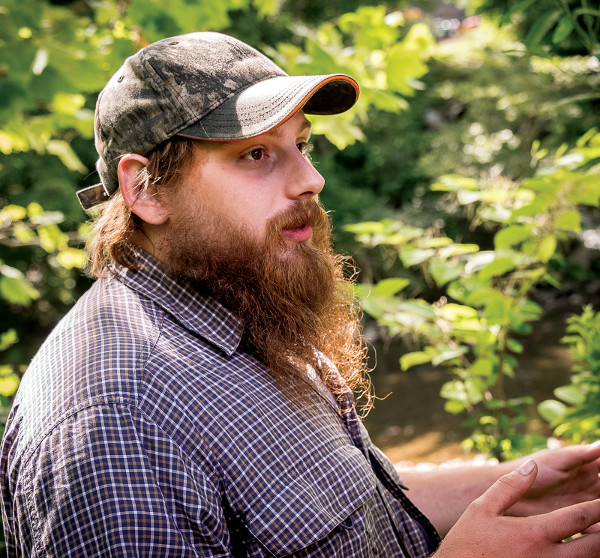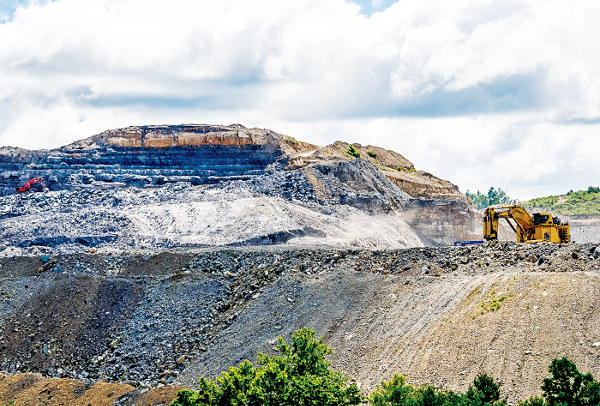
PHOTOS/BRETT JELINEK, OLAFIMAGES.COM
Editor’s note: Junior Walk, who used to work in the coal industry and now works with Coal River Mountain Watch in Naoma, West Virginia, was interviewed by the People’s Tribune in September 2017. He told us his story as he showed us mountaintop removal sites and towns decimated by poverty and the toxic coal industry. Edited for length.
For generations my people have lived right in this area. Most were coal miners.
I had poisoned water when I was a little kid. The water used to come out of my tap blood red everyday, smelling nasty and that was from underground coal slurry injection. And my dad—he worked at the plant down there—was always like, “No, that’s not what that’s from. That’s just iron from our well.” And after he got laid off, and he had a little bit of time to think about it he was like, “You were right. That wasn’t just iron water.”
It’s like, if you pay somebody a decent enough payday, then they’re gonna believe what you want them to believe because they’ve gotta pay that truck payment. They’ve gotta pay for that swimming pool they just put in. They’ve gotta pay for that brand new four-wheeler they just financed. And the company is very good at making you go out and finance stuff.
Fifth grade, down there at Marsh Fork Elementary School, we had the coal industry people came in and give a little workshop and hand out coloring books and all that; stuffed animals and stuff. Also, there was one Christmas where Massey Energy, that ran the prep plant over there, handed out Christmas presents to all the kids in my school. Got a little set of Hot Wheels cars. That was definitely worth having a toxic waste lake right above my school.
When I was 17, getting ready to graduate high school, I applied to a bunch of different colleges. I was really excited to leave out of West Virginia and never return. I didn’t think there was anything here for me. So I got accepted to a few colleges, then quickly come to the realization that you kinda need money to go to college in this country. So I was pretty well up a creek. I was the first person in my family to graduate high school, but had no idea how to apply for financial aid, scholarships, or grants. So I was stuck here. And like many people who end up in that same situation, I went to work in the coal industry; the only industry around here that pays enough to live off of.
On a twelve-hour shift on a mine site of that size [pointing to a nearby mountaintop removal site], there would have been between seven to twelve people employed. You compare that to an underground mine that produced a similar tonnage of coal, that would be well over 100 people on a 12 hour shift. So it’s a stark difference.
The population here, and coal employment here, have been on a stark decline since the mid 1980s, which is when you have the advent of this large scale surface mining, which is pretty much the ultimate form of mechanization for coal mining. So it doesn’t matter how many jobs are supposed to be coming down here, it won’t be anything comparative to what coal mining once was here.
The people making the money on coal live somewhere else, out of state somewhere and never had to work a real day in their lives—wear a three-piece suit to work every day and keep their hands clean. Those are the people who are really doing this. Those are the bad guys.
It’s a corporate oligarchy here in southern West Virginia. And that seems to be the direction the rest of our country is moving. This is a microcosm of what that’s gonna look like for the rest of us, for the rest of y’all, the rest of the country.

Photo/Brett Jelinek, Olafimages.com
Mountaintop removal: Destroying communities and the environment
Latest
The People’s Tribune opens its pages to voices of the movement for change. Our articles are written by individuals or organizations, along with our own reporting. Bylined articles reflect the views of the authors. Articles entitled “From the Editors” reflect the views of the editorial board. Please credit the source when sharing: peoplestribune.org. Please donate to help us keep bringing you voices of the movement for change. Click here. We’re all volunteer, no paid staff. The People’s Tribune is a 501C4 organization.

